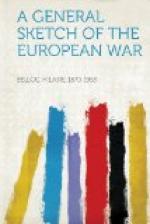The immediate approach of this death and the cold wind of it face to face produced in the French people a singular reaction, which even now, after eight months of war, is grimly seen. Their irony was resolved into a strained silence. Their expectation was halted and put aside. They prophesied no future; they supported the soul neither with illusions nor with mere restraint; but they threw their whole being into a tension like that of the muscles of a man’s face when it is necessary for him to pass and to support some overmastering moment. There was no will at issue with the small group of united wills whose place was at the headship of the army. The folly of the politicians had not only ceased, but had fallen out of memory.
It is no exaggeration to say that the vividness of that self-possession for a spring annihilated time. It was not a fortnight since the blow had come of the 15th Corps breaking before Metz, and the stunning fall of Namur. But to the mind of the People it was already a hundred years, and conversely the days that passed did not pass in hours, or with any progression, but stood still.
There was to come—it was already in the agony of birth—the moment, a day and a night, in which one effort rolled the wave right back. That effort did not release the springs of the national soul. They remained stretched to the utmost. By a character surely peculiar to this unexampled test of fire, no relaxation came as, month after month, the war proceeded.
But the passage of so many days, with the gradual broadening of vision and, in time, the aspect, though distant, of slow victory; the creeping domination acquired over the mass of spiritually sodden things that had all but drowned the race; the pressure of the hand tightening upon the throat of the murderer; released a certain high potential which those who do not know it can no more comprehend than a savage can comprehend the lightning which civilized man regulates and holds in the electric wire. And this potential made, and is making, for an intense revenge.
That is the vision that should remain with those who desire to understand the future the war must breed, and that is the white heat of energy which will explain very terrible things, still masked by the future, and undreamt of here.
FOOTNOTES:
[2] The ultimatum expired at midnight (August 4-5) by Greenwich time, 11 p.m. (August 4) by German, or Central European, time.
[3] AA is holding the obstacle OO against a superior number BB. There are six passages across OO. If BB forces No. 5 and No. 6 he creates the situation in the following diagram, where it is obvious that BB is now on the flank of AA, and that AA must retire, even if he still holds passages 1, 2, 3, and 4. That is what happened when Namur fell. The French could hold, and were holding, the Germans along the Sambre, above Namur; but the bridges of Namur, which were thought safe behind the forts, had fallen into German hands.




